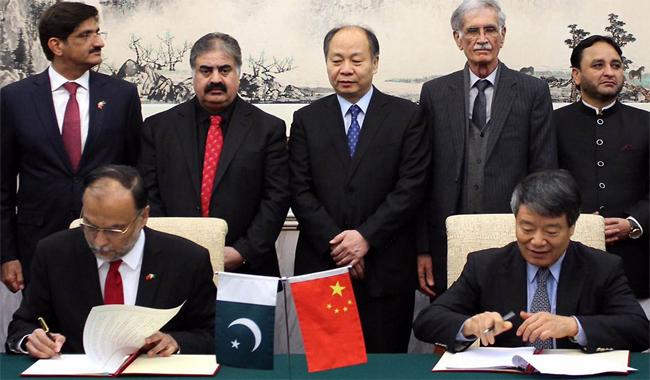Dawood Ibrahim
SENIOR MEMBER

- Joined
- May 25, 2016
- Messages
- 3,475
- Reaction score
- 3
- Country
- Location

Bhasha Dam, Peshawar-Karachi railway line, Karachi Circular Railways approved; Keti Bandar, special economic zones, three energy projects in Sindh added to project; Orange Line trains for all provincial capitals
ISLAMABAD: Pakistan and China have formally approved to include ML-1 Peshawar-Karachi railway line project and some infrastructure projects in the framework of the China Pakistan Economic Corridor (CPEC), jacking up its overall size from $46 billion to $54 billion (approx Rs5,700 billion) as well as establishing eight industrial estates located in all the four provinces and special areas, including Fata, AJK, Gilgit-Baltistan and Islamabad Capital Territory (ICT).
On the eve of Sixth Joint Coordination Committee (JCC) meeting held at Beijing, both the sides agreed in principle to expand the list of projects for inclusion in the CPEC framework after which the overall size of the CPEC projects might go close to $60 billion but it would take a few more months to meet all the procedural requirements.
Both the sides agreed to form a special group on water storage and consider the Bhasha Dam for which Chinese delegation would visit Pakistan by next month. Both the sides also agreed in principle to include the mass transit system of railways for each province for making it as part of CPEC and now feasibility studies would be made to go ahead with the approval of the Joint Working Group. Both the countries also agreed to include the Orange Line Project and Karachi Circular Railway for inclusion in the CPEC.
The JCC approved the inclusion of four new projects in the CPEC framework, including ML-I Peshawar-Karachi railway line project. The total cost of the project is over $8.8 billion out of which China is expected to give $5.5 billion loan while the remaining amount will be provided by the ADB.
The JCC also approved to include three projects of the National Highway Authority (NHA) in the CPEC framework. These include $200 million Khuzdar-Basima Road project, Dera Ismail Khan-Zohb project of western route worth $800 million and a missing section of Thakot-Havelian of the eastern route having length of 136 kilometres.
While addressing the Sixth JCC meeting, the minister pleaded the case for Gwadar and said that the master city plan and the related projects are likely to bring socio-economic stability in Gwadar. He added that an agreement on 300MW power project has been signed and the project would be started soon. He also highlighted the Gwadar water supply project, hospital and technical institute projects and stressed the timely completion of these projects to bring a positive message of hope and support to the local people in Gwadar. In addition, the minister appreciated the Chinese commitment to help and start the mass transit railway project in the provincial headquarters, which will provide great facility to millions of people in Pakistan.
The minister also appreciated the consideration and inclusion of projects proposed by the provinces in infrastructure and energy to harness different opportunities and development in various parts of Pakistan to distribute benefits of CPEC among all the provinces and regions. He further mentioned that one industrial zone in each province had been identified and selected on the basis of their market attraction and principles of business.
Ahsan Iqbal stated that three years ago when China and Pakistan started the journey of CPEC, there were many doubts about covering so much ground in a very little time. He said that with the support of political leadership, hard work of officials of both the countries, CPEC had become the biggest project of regional connectivity in the world. "CPEC is the flagship project of One Belt, One Road showing how one belt one road can transform the regional cooperation into reality and bring benefits to millions of people."
He said that one proof of success of CPEC is that today think tanks from all over the world, including America, Canada and Europe, are doing research to analyse the impact of CPEC in the region. The minister maintained that CPEC had added more value to the friendship of China and Pakistan. CPEC had become the north star of friendship between China and Pakistan, making the friendship even higher than skies.
https://www.thenews.com.pk/print/175541-CPEC-soars-to-Rs5700-bn
@PaklovesTurkiye @LA se Karachi







